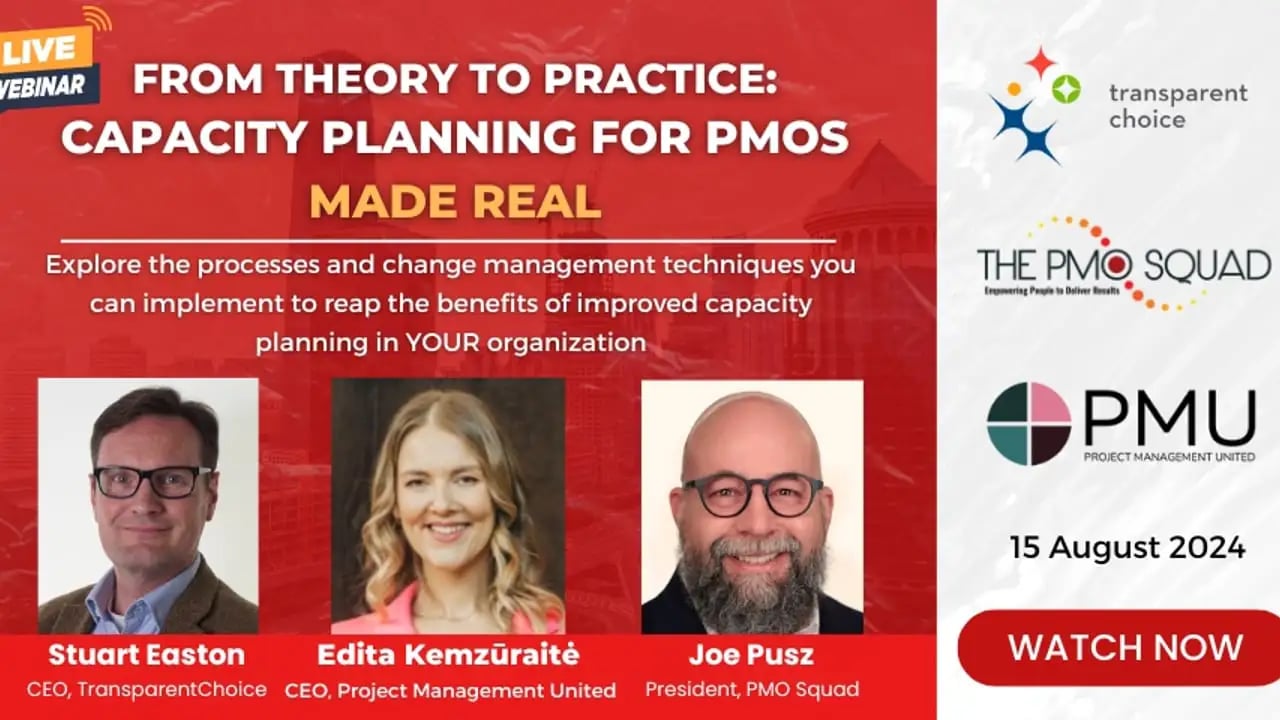Capacity Planning for PMOs Made Real

Speakers

Edita Kemzūraitė is a senior project manager and certified PMO practitioner with extensive experience in stakeholder engagement, business sustainability, and transformation initiatives. At Bentley Systems, she has led complex projects in the software industry, bringing expertise in agile delivery, change management, and international collaboration.

Joe Pusz, known as PMO Joe, is the founder of PMO Squad Staffing and a leading voice in project management. He co-founded International PMO Day, The PMO Leader, and the Veterans Project Management Mentoring Alliance (VPMMA), and hosts the Project Management Office Hours podcast. Recognized as PMO Influencer of the Americas (2022) and consistently ranked among the top global PMO influencers, Joe brings extensive experience in organizational project delivery, leadership, and mentoring.

Stuart helps PMO and portfolio leaders build strategy-aligned portfolios and prove ROI. A guest lecturer on project prioritization at the University of Oxford, he speaks widely on killing pet projects, focusing investment on value, and using decision science (AHP) to make clear, defensible choices.
About this webinar
Capacity planning is one of the most critical — yet often misunderstood — elements of portfolio management. Done well, it aligns people, technology, and financial resources with strategic goals. Done poorly, it creates chaos, overworked teams, and projects that struggle to deliver.
In this interactive session, Stuart Easton is joined by Edita Kemzūraitė and Joe Pusz to explore what capacity planning really means in practice, how it differs from simple resource management, and why it is essential to organizational success. Together, they break down the core concepts, share real-world stories, and highlight both the benefits and pitfalls of different approaches.
Key themes include:
- Understanding capacity planning as a forward-looking discipline that improves delivery outcomes by aligning resources with strategy
- Why it’s not just resource management — moving from reactive allocation to proactive, organization-wide planning
- The organizational benefits — reduced chaos, stronger executive decision-making, improved morale, and more successful projects
- Case studies and lived experience — including Edita’s Bentley Systems example, where smarter planning improved customer support response times by 85%
- The cost of multitasking — how task switching can quietly erode up to 40% of team capacity, and how planning helps reclaim it
- Modern tools and technology — with Stuart showing how AI-powered scenario planning can generate and test thousands of portfolio roadmaps in minutes
Throughout the conversation, the panel emphasizes that capacity planning is not an isolated process but part of a broader organizational journey. It requires transparency, executive engagement, and a focus on business outcomes rather than project mechanics.
The result? A practical and insightful discussion that shows how organizations can tame the chaos of overloaded portfolios, unlock hidden capacity, and deliver greater value through smarter, data-driven planning.